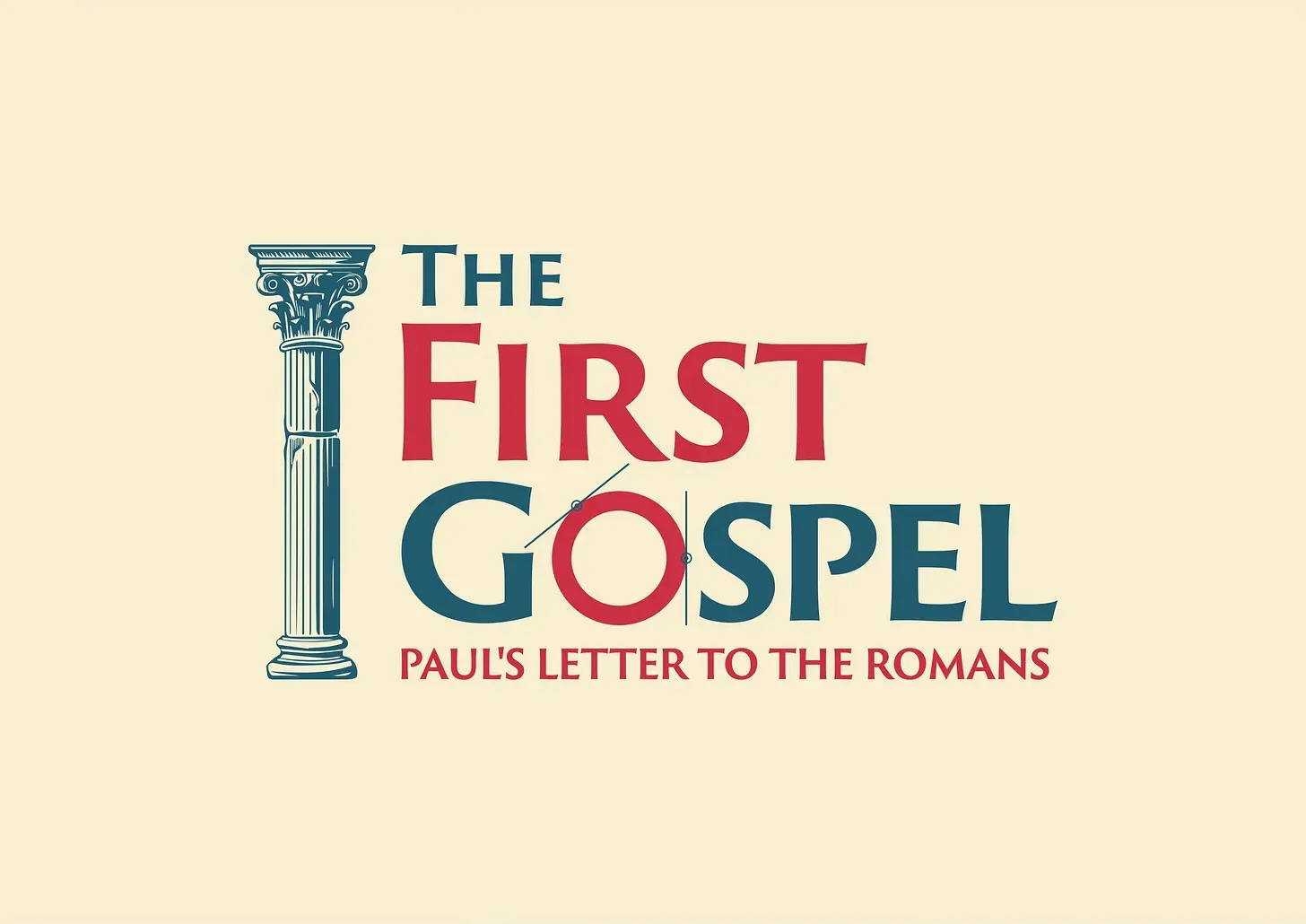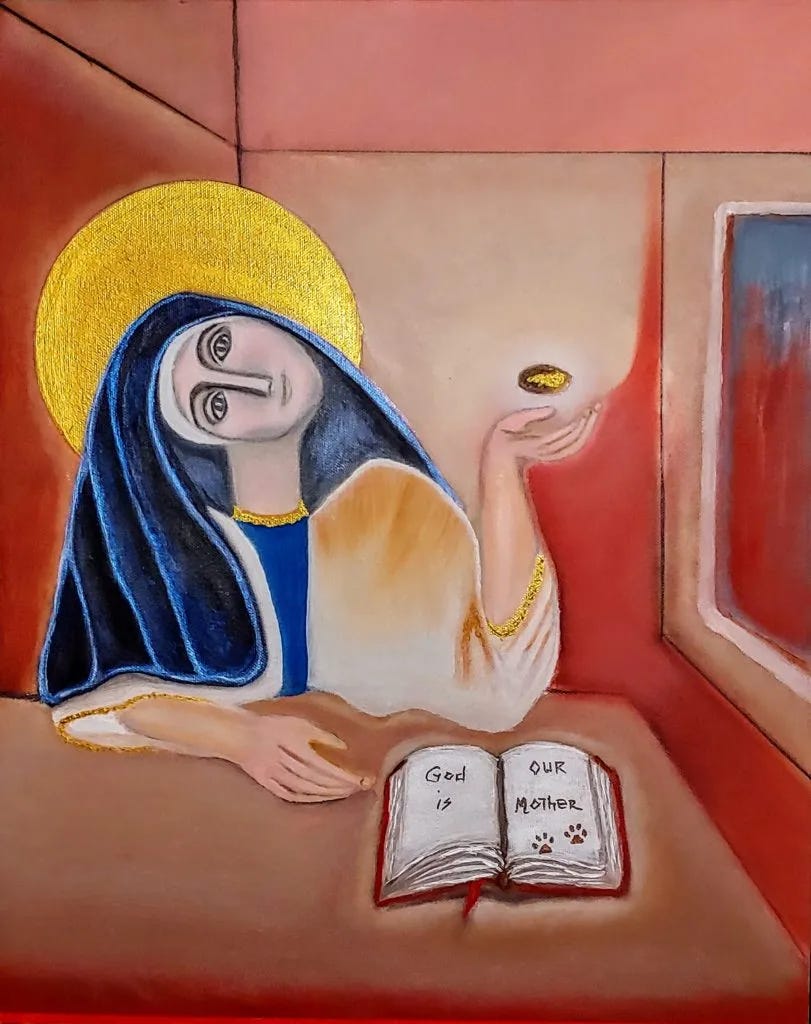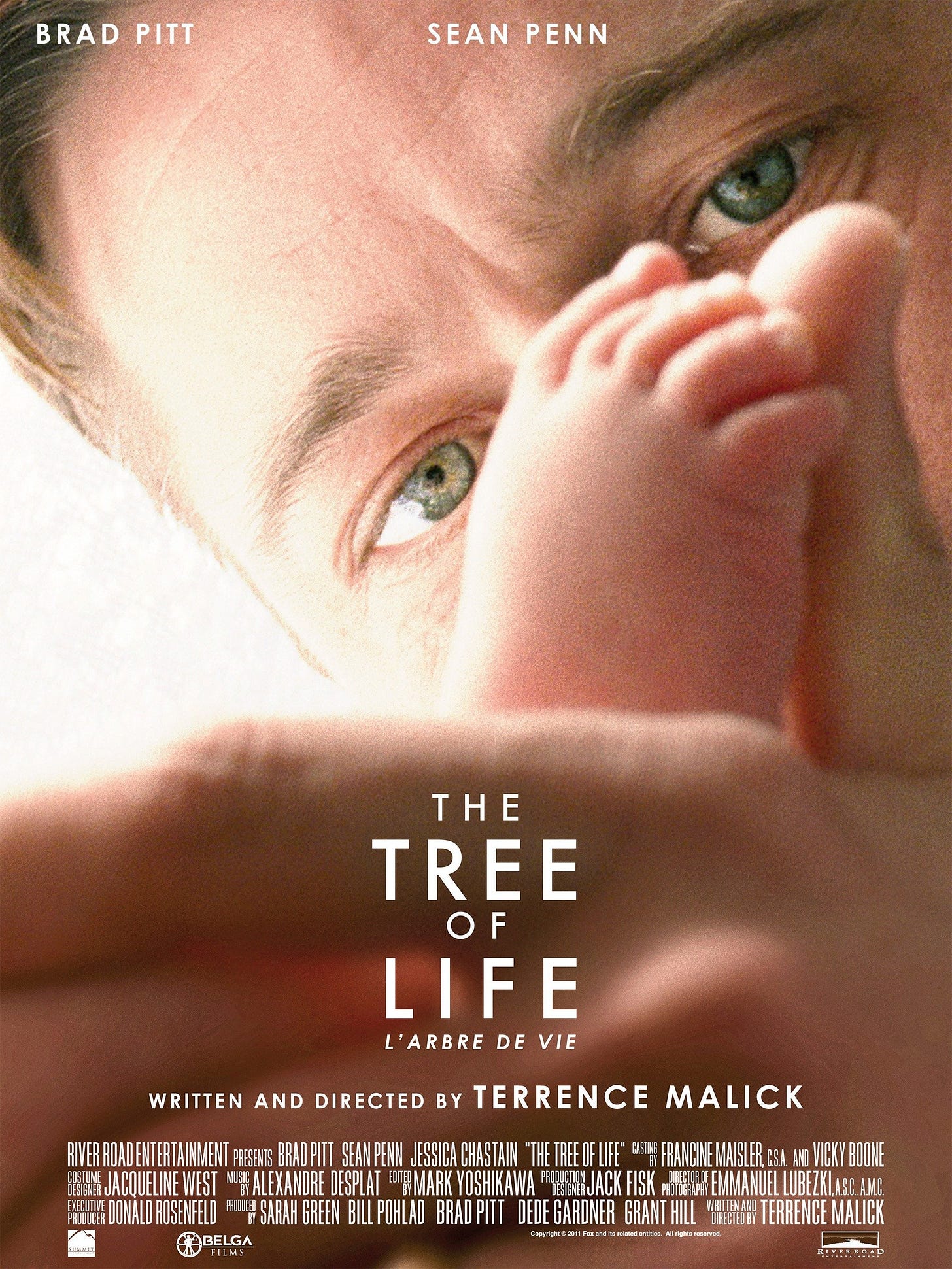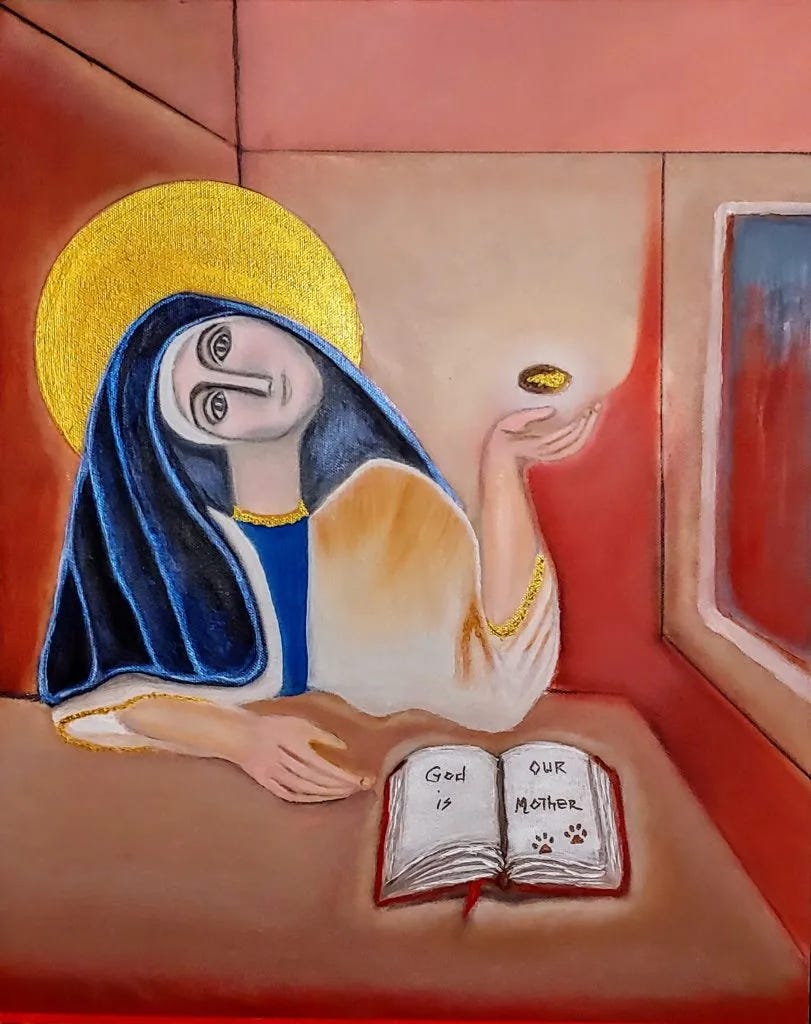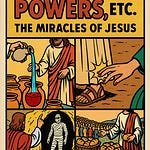Romans 8.18-30
One of my favorite quotes comes from Julian of Norwich.
It’s a sentence “almost infinitely dense.”
Julian writes:
“God never began to love mankind.”
Julian— Julian of Norwich— was an English anchoress in the Middle Ages. Her writings, known as the Revelations of the Divine Love- or, Showings— are the earliest surviving works in the English language written by a woman. That you may not have heard of Mother Julian is an example of the perniciousness of the church’s patriarchy. In the middle of the fourteenth century, though she lived in seclusion in her monastic cell, the Black Death devastated Norwich. In May 1373, Mother Julian, lying on what she feared was her deathbed, received her revelation of divine love in sixteen “showings.” Twenty years later, she completed a lengthy reflection on these visions of Christ’s Passion, which the theologian Rowan Williams has called the most important work of Christian theological reflection in the English language.
In the thirteenth showing, which includes the best-known lines from her works, she admits to herself that she is troubled by how God has acted in time, vexed by the apparent failure of the providential order in making a world in which it is possible to sin and sin so grievously.
Julian writes in her reflection:
“I saw that nothing lead me but sin. And so I beheld generally in us all, and I thought: “If sin had not been, we should all have be clean and like to our Lord as he made us.” And thus in my folly before this time, often I wondered why, by the great foreseeing wisdom of God, the beginning of sin was not prevented. For then thought me that all should have be well… morning and sorrow I made therefore without reason and discretion. But Jesus, in this vision then informed me of all that I needed, answered by this word and said: “Sin is behovely, but all shall be well, and all shall be well, and all manner of things shall be well.”
All shall be well.
And all shall be well.
And all manner of things shall be well.
When Christ revealed to Julian of Norwich that all manner of things will be well, what all did Jesus mean? Which things?
How many things exactly are included in his promise that “all manner of things will be well?”
In 2011, the filmmaker Terrence Malick released his fifth film, The Tree of Life, starring Brad Pitt, Sean Penn, and Jessica Chastain. Trained as a philosopher at both Harvard and Oxford, Malick taught at M.I.T as a young man. After establishing a relationship with Jack Nicholson, Malick transitioned to directing with the 1973 film Badlands.
On the surface, The Tree of Life centers on the joys and struggles of a nuclear family, the O’Briens, in 1950’s Waco, Texas. The early death—possibly by suicide—of one of Malick’s younger brothers informs the film’s plot. To the extent the film has a plot. Indeed to say that The Tree of Life is about a domestic family’s ups and downs in post-war Texas is a bit like saying the Book of Genesis is about a man named Noah. The impossibly wide horizon of The Tree of Life is precisely what frustrated many of the film’s audience.
The film offended viewers for refusing to offer them a linear storyline. Malick shows viewers miniatures of this family’s life—playing outside, working in the kitchen garden, learning to catch a ball— yet these glimpses of ordinary domesticity reliably transform into brilliant, even stunning, depictions of creation. “The delights of the ordinary and the magnificence of all creation,” Beverly Gaventa comments on the film, are juxtaposed with one another.” Just so, the heart of the film is found less in that nuclear family than in the relationship between the family and the creation which surrounds them. Or better yet, the heart of the film is the relationship between a single house of humans, the creation which surrounds them, and the Creator.
For many in the audience, the film’s unimaginably large context— its wide cosmic scope: from a single human family to dinosaurs, from the death of a son to the Big Bang and the One who banged it— was simply too much for viewers to absorb.
Terrence Malick, the director, is not only a trained philosopher, he is a Christian. In fact, one reviewer called The Tree of Life “the longest and best sermon I’ve ever sat through.” In terms of scale and plot permutations, Malick’s fifth film The Tree of Life is not unlike Paul’s Epistle to the Romans.
Karl Barth said that a careful reading of scripture will always yield “much sweat and many groans.” Case in point: the pivot Paul makes in the middle of his letter’s eighth chapter.
Despite broad assumptions that Paul’s epistle concerns the work that God has done in Jesus Christ to save individual humans, in verse nineteen the apostle screeches the brakes to take an unexpectedly hard turn off the “Romans Road.”
Just as he has settled into exalted language about the inviolable inheritance for those in Christ Jesus— those whom the Spirit has liberated, Paul pivots to speak not of us and our anticipated glory but of creation.
All of creation.
All manner of things shall be well.
Like the director’s lens turning from a family in Texas to the foundation of the earth, Paul pans out from those baptized in Christ’s death. He widens the frame to include creation itself. As my teacher Beverly Gaventa notes, thus does “the cosmic, world-encompassing character of the epistle” come into view. The actions of God in Jesus Christ incorporate more than individuals. The cross Christ bears bears cosmic consequences.
As Mother Julian might put it, “God never began to love creation.”
The work of God in Christ Jesus involves more than individuals.
The apostle’s claim should not surprise us. Paul attests nothing more than Jesus stipulates to Nicodemus. In the Gospel of John, Jesus does not testify under the cover of night,“God so loved sinners that he gave his only Son…” No, Jesus makes the matter plain to Nicodemus that the object of the Father’s redemptive love is the world. And the word Jesus uses to describe the effects of the Father’s gift of the Son, belief and everlasting life— a word usually translate everyone, is the Greek word pas. It’s an adjective that again echoes Julian. It means “all things.”
Literally, Jesus informs Nicodemus:
“For God so loved the world that he gave his only Son, so that all things may believe in him and not perish but may have everlasting life.”
The work of God in Christ Jesus involves more than individuals.
Paul’s point should not surprise us, for “even the winds obey him.” The fish and the loaves listen to his word. Water turns to wine at his willing. He even teaches in his Sermon on the Mount that no less than the grass and lilies of the field exceed Solomon’s robes in their divinely-lavished glory. On Palm Sunday, as the begrudgers attempt to silence his disciples’ acclaim, Jesus rebukes the Pharisees. “I tell you,” Jesus says, “If these disciples were silent, the very stones would cry out.”
Evidently, on Palm Sunday the Lord intended more than personification, for when Paul pans out and widens the frame, we see that Christ’s cross and resurrection elicit cosmic consequences. In Romans 8 the vast horizon of God’s act in Jesus Christ comes into view with creation itself groaning in anticipation. All of creation groans, waiting.
Creation waits not for your final, realized redemption.
Creation waits not for my final, realized redemption.
Creation groans in wait for its own final rescue.
The very stones are crying out!
For themselves as much as for me or for you!
Paul’s pivot from those baptized in Christ to all of creation should not surprise us. We sing this news every Christmas, “He comes to make his blessings flow/Far as the curse is found!” And the carol’s first verse does not invite heaven and humans to sing in adoration of God’s arrival through Mary. The carol beckons all of nature— all things— to join heaven’s joy.
The Tree Of Life is a story of epic scale told on an intimate level. For example, the film opens, via memory and flashback, with Jessica Chastain learning that her oldest son R.L. has died in the service. While the film remains anchored to the O’Brien family in both and present, midway through the movie Terrence Malick diverts to a thirty minute mediation on the cosmos. Suddenly the family drama has become a 3D Space Odyssey. Malick shows the Earth’s conception, from Big Bang to the Ice Age and beyond. The events of O’Brien family are overlaid against the emergence of dinosaurs, evolution, and the forming of the land. The cosmic set piece ends with the birth of the O’Brien’s youngest son, Jack. The Tree of Life shows Jack learning to walk and learning to speak, trick-or-treating on Halloween and meeting his older brother for the first time.
When I first viewed the The Tree of Life in the theater, the thirty minute turn from the personal to the cosmic— from the intimate to the all-encompassing— was more than many in the seats could tolerate. As soon as the film widened the frame to seventy-five million years ago and showed the maternal love of a dinosaur, I heard more than a few pairs of feet squashing spilled popcorn as they escaped in the darkness.
For many in the theater, the cosmic scale of the O’Brien’s story made for a bad film.
For the story Paul seeks to proclaim, however, the wide horizon and cosmic scope is precisely what makes the gospel good news.
In my sermon last Sunday, I explained how scripture’s promises to those who are in Christ Jesus (and consequently have the Spirit of Jesus) are intelligible only in the context of Paul’s larger argument which begins back in chapter six. Simply, those who are in Christ Jesus and have the Holy Spirit are those whom God has baptized.
On Monday, a woman named Sandra sent me an email:
“Good evening Jason,
I am emailing you from New Zealand where I live. My young adults and I worship with your church online. After listening to your sermon, we wondered what you would say to the young man you mentioned in your sermon if he had answered your question differently. When you asked him if his dead sister was baptised, what if he had responded, “No. No, she isn’t baptised?”
We have a friend who lost her teen son in a drowning incident. He was unbaptised and didn’t know Jesus. Since then his Mum has been learning with us about Jesus. What can we say to her about hope for her dear son?
Thank you so much for any help.
May your church keep up their life giving work. It is so deeply needed.
In Christ,
Sandra”
In my quick reply, I promised Sandra that an answer would emerge as we watched the apostle Paul pan out and widen the frame.
In the same way that modern Bibles’s chapter and verse divisions can mislead readers, human egocentricity can also mask Paul’s intended meaning. For instance, if you come to the scriptures with the presumption that only human creatures can be the objects of God’s salvific work in Christ, then you may fail to notice that in Romans 8 the grammatical subject of verses nineteen through twenty-four is creation. Throughout, creation’s eager anticipation is the subject of the sentences. The we of which Paul speaks in the passage is all of creation. And when Paul writes of the Holy Spirit’s work on our behalf in verse twenty-six he refers back to the very same subject.
The us in “on our behalf” is not you and me.
The us is you, me, and the earth beneath our feet and every creature therein.
The Spirit is at work in the present, interceding with the Father, for all of creation. The glory that is incomparable to present suffering, the glory that all things are inexorably if inexplicably moving towards, is a glory for human and non-human creatures alike— not just baptized believers or babies in utero but birds in the sky and dogs on your lap. All of creation waits, Robert Jenson writes, “or rather, it cannot wait. Though we cannot understand it, this waiting too is verbal. The prayers of creation, perhaps the only true and necessary speaking in tongues, are the Spirit’s.”
“Let everything that has breath praise the Lord,” the psalmist sings.
Breath includes many more than creatures like you or me.
In other words, C.S. Lewis was not being childish when he portrayed Mr. and Mrs. Beaver as eager to greet Narnia’s Redeemer. He was instead proving himself an astute reader of Paul and his scriptures. This is more than a fanciful interpretative insight. Failure to grasp the cosmic scope of Christ’s saving work— human and nonhuman creation— sends us right back to the epistle’s opening indictment. Paul made clear in chapter one that the origin of humanity’s enslavement to Sin lies in our refusal to understand ourselves as made by God, creatures like all the other nonhuman creatures. Creation, every earthly thing that is not God, encompasses both human and nonhuman life, all of which together groans in wait for the culmination of God’s redemptive action.
To see ourselves, then, as unique recipients of Christ’s saving work over against the lilies of the field and the birds of the air is only to replicate our originating sin.
The blessing of the gospel does indeed extend as far as the curse is found.
The claim here that all of creation awaits the final result of cross and resurrection is no different than what the apostle will proclaim later in the letter. “Because from him and through him and to him are all things,” Paul writes.
Not all people.
Not even all believers.
To him are all things; i.e., the destiny of everything is him.
The destiny of everything is Christ.
Paul likewise widens the horizon of the salvation story for the Corinthians. “Yet for us there is one God,” Paul writes, “the Father, from whom are all things and for whom we exist, and one Lord, Jesus Christ, through whom are all things and through whom we exist.” Meanwhile, to the Ephesians the promise is just as incomprehensibly cosmic in scope, “According to the Father’s good pleasure he set forth in Christ, as a plan for the fullness of time, to gather up all things in him, things in heaven and all things on earth.”
What Christ revealed to Paul about the cosmic scope of his redemptive work is exactly what Christ showed Mother Julian in the Middle Ages. In the third showing she received from Christ, Julian of Norwich hears Jesus say to her, “full blissfully” (that is, brimming with delight):
“See, I am God. See, I am in all things. See, I do all things. See, I never left my hands of my works, nay never shall I without end. See, I lead all things to the end that I ordain them to, from without beginning, by the same might, wisdom, and love that I made all things. How should any thing be amiss?”
In my brief and hasty reply, I promised Sandra that the answer to her question would emerge as we watched Paul widen the horizon. But, just to be sure, I wrote her a response:
“Dear Sandra,
Thank you for your reminder that what Christians think and say matters for matters that matter.
You asked me what we can say, as Christians, to your friend about her son. No doubt, we all have friends who know not Christ just as we’ve all lost loved ones who have died without the certainty of faith that baptism provides.
First—
I would say to your friend that Karl Barth insisted that the only difference between a Christian and a non-Christian is a noetic difference. That is, Christians do not possess a favor or a future that belongs uniquely to us. Rather, Christians simply know what the non-Christian does not know about our future. Baptism is a visible word of God. The unbaptized do not lack the same future as the baptized. They lack a sign to know this future with certainty in the present.
Second—
If your friend is curious, then I would point her back to the ancient church fathers. The greatest of these, Maximus the Confessor, summarized his predecessors’s teaching with the axiom, “Creation is Incarnation.” For Maximus and the fathers, Christ does not name a genus. Christ does not even name merely an individual, the boy born to Mary. Christ names all of creation.
As Maximus elaborates on his axiom, “The Word wills always and in all things to accomplish the mystery of his Incarnation.”
Following Paul in places like Romans 8, the church fathers teach that in the Incarnation, the flesh of the world— i.e, all of creation— became the flesh of Christ in his humanity. “In the Incarnation,” says Maximus, “the entire world becomes Christ’s receptacle.” This is why Jesus can turn water to wine and still the storms. Everything is his flesh. And having his flesh, everything— all things: human non-human, living and dead— is moving, invisibly, towards the final transfiguration of the world.
To make it plain—
The Christian hope is not for our transfer from creation.
The Christian hope is for the transfiguration of creation.
All things are headed to Christ.
All things are on their way to becoming— fully so— Christ.
That’s Romans 11 but also 1 Corinthians 15: all things have their destiny in God. That means your unbelieving friend, yes, as well as her son. But just as surely it includes the fish and plankton with which he swam. And it includes too the sea that held all of them like things woven, giving them life and delight. Even the stars above that sea will one day sing Christ’s praise.
As a preacher, I am all too aware how impossible it is to communicate a hope so incomprehensibly cosmic in scope. All I know to say after all these years, after hundreds of burials, and several brushes with my own death— all I know to say— is that the gospel is not just good news for some. The gospel is good news with no exceptions. The gospel is good news without remainder. The gospel is good news for all creatures of our God and King.
Finally—
Tell your friend that God never began to love creation.
Just so, creation will never cease to be the object of the Father’s love, for now and forever the world is the flesh of his Son. And whether they like it or not, that body includes both your friend and her boy.
In Christ,
Jason
“Just as you did it for one of the least ones,” Jesus says in the Gospel of Matthew, “you have done it to me.”
That’s neither sentimentality nor moralism.
It’s the gospel truth.
All things are Christ.
All things are becoming Christ.
Therefore—
Today you have less reason to shy away the table than you did yesterday.
After all, the mystery is not simply that creatures of bread and wine can become the body of God. The mystery is that all creatures— even you: sinful, unbelieving, religious but not reliable you— are being transfigured into Christ.
You see—
The promise is that Christ is for you in a much bigger way than you can possibly comprehend.
And, I’ve come to the end of my ability to communicate this hope.
So come to the table.



